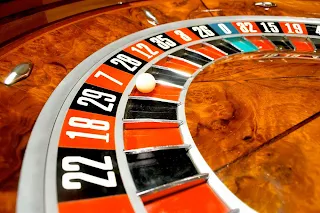11/29/2010 Portland, Oregon – Pop in your mints…
Today as tensions in Korea continue we find ourselves pondering an activity that is vilified in many circles yet is an indispensable part of everyday life, modern or otherwise. This vilified activity is popularly called speculation.
What is speculation? To read the financial news over the past two years, one could equate speculation with gambling. In a way, they would be correct. A speculative action involves accepting a known risk in exchange for a reward that is uncertain. All that can be said for certain is that the speculator, the person taking the risk, believes that the reward to be received outweighs the risk that is accepted. Only with the benefit of hindsight can one say that the speculation was brilliant or insane. Before hand, all opinions as to the speculation are in and of themselves simply speculations with regard to the speculation that they are speculating about.
 |
| Red or Black? Speculators gamble so consumers don't have to! |
Why are we using so many quotations above? You will notice that the words in quotations indicate a value judgment about what the price of a barrel of oil should be. Not what it actually is or was. So we pose the question, how much should a barrel of oil cost? $20, $60, $80, $146? More? Less? What is the answer?!?!?!? This, of course, is a trick question. The cost of a barrel of oil is a function of whatever you are willing to pay for it combined with whatever a willing seller is willing to sell it to you for. If the two of you cannot come to an agreement as to price, there will be no purchase or sale. On an individual level, this is clear as a bell.
But take it to a larger level with something as ubiquitous as oil and a different, collective mindset begins to take over. No longer are buyers and sellers free to determine prices that they deem to be mutually beneficial, rather, society determines a price level and chooses to call that price "normal" and anything lower or higher "abnormal." While nobody complains about low prices, everybody complains about high prices! Some mysterious force is driving up the price of something that we used to enjoy at "normal" prices. There must be a villain and they must be punished! These villains are called speculators. If we could only keep the speculators from participating in the market and "artificially" driving up prices, we could all enjoy the commodity at normal prices, right?
In the case of the oil shock the entire US economy, which seemed to be in an unstoppable boom cycle at the time, was calibrated to run on $20 per barrel oil. It is understandable that adjusting to $146 per barrel oil would be painful and cause for complaint! But was $20 a "normal" price?
What all of this collective "wisdom" as to what the price of something should be ignores is that, without speculation or those willing to speculate, markets, the ability to buy and sell things that are produced, cease to function. Speculators allow the producers of oil or any other good or commodity to continue producing on a relatively even basis. Moreover, speculators transmit important price signals to the producers. Higher prices = increase production. Lower prices = decrease production. Without speculation, producers are left in the dark as to consumer's needs for what they produce. Without this information, markets cease to function and a return to primitive production methods and a lower standard of living is inevitable.
So it is not higher prices that are to be feared, rather, we must have a greater fear of the absence or vilification of speculators in a market economy. Higher prices drive increased production which will by definition lead to lower prices. Higher prices cure themselves. Speculators, on the other hand, are indispensable. If speculators to not fill the crucial gap between producer and final consumer, markets cease to function and nothing will be produced on a large scale. They are the headlight on a train going through a dark tunnel. There may be trouble on the tracks ahead but with speculators lighting the way, at least the train of production has a chance to avoid disaster.
We must keep this in mind as we hear the Portuguese and Spanish governments claim that the speculators are wrong, they do not need a bailout similar to the Greek and Irish governments. At the moment they may very well not, but speculation must see farther into the future than most bureaucrats are willing or able to look.
Stay Fresh!
P.S. If you enjoy or at least tolerate The Mint please share it with your family, friends, and colleagues!
Key Indicators for Monday, November 29, 2010
Copper Price per Lb: $3.75
Oil Price per Barrel: $84.18
10 Yr US Treasury Bond: 2.86%
FED Target Rate: 0.20%
Oil Price per Barrel: $84.18
10 Yr US Treasury Bond: 2.86%
FED Target Rate: 0.20%
MINT Perceived Target Rate*: 5.25%
Unemployment Rate: 9.6%
Inflation Rate (CPI): 0.1%
Dow Jones Industrial Average: 11,092
M1 Monetary Base: $1,763,900,000,000
M2 Monetary Base: $8,707,500,000,000
Unemployment Rate: 9.6%
Inflation Rate (CPI): 0.1%
Dow Jones Industrial Average: 11,092
M1 Monetary Base: $1,763,900,000,000
M2 Monetary Base: $8,707,500,000,000
*See FED Perceived Economic Effect Rate Chart at bottom of blog. This rate is the FED Target rate with a 39 month lag, representing the time it takes for the FED Target rate changes to affect the real economy. This is a 39 months head start that the FED member banks have on the rest of us on using the new money that is created.

No comments:
Post a Comment